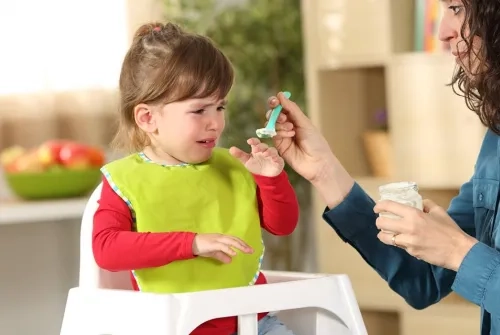Alo Yeditepe
Alo Yeditepe
Is the Incidence of Reflux Increasing Among Children?
If there is weight loss and restlessness, be careful!
Is the incidence of reflux increasing among children?
Reflux, which is thought to be an adult issue, can occur in children or even babies. Studies show that among all children, the rate of those with reflux is 15 percent. Yeditepe University Hospital Pediatrics Pediatric Gastroenterology Specialist points out that children with restlessness, nausea, and especially weight loss should also be assessed for reflux.
Reflux occurs due to the leakage of stomach contents back into the esophagus because of the looseness in the valve (muscle) between the esophagus and the stomach. The recent increase in reflux signs in children of all age groups is important. Because besides reducing the quality of life of children and parents, if left untreated, this problem can also pave the way for various diseases such as asthma, esophageal damage, recurrent middle ear infections, and pneumonia. Allergies, especially food allergies, can cause damage to the esophagus, resulting in signs of reflux. As their developmental process continues, reflux is more common among babies.
Reminding that children have difficulty gaining weight due to reflux, Yeditepe University Hospital Pediatrics Department, Pediatric Gastroenterology Specialist states that in addition to this, children's development can also be affected. Furthermore, there is also a risk of developing anemia, as acid escaping from the stomach into the esophagus can lead to tissue damage and minor wounds.
Symptoms Can Be Confused
Reflux-related complaints can vary between infants and children. For example, nausea, vomiting, and weight loss are observed in infants, while vomiting is not experienced in children, but burning in the chest, hoarseness, and slowing of development occur. Explaining that many symptoms are confusing in general as they show similarities with those of different diseases, our specialist spoke as follows: "Especially in upper respiratory tract infections that develop together with reflux, if the underlying cause is not detected, the child may be exposed to prolonged and recurrent antibiotic treatments. In addition, complaints such as chest pain or tightness can also be confused with heart-related diseases. Therefore, it is vital to be vigilant about reflux symptoms and consult a doctor without wasting time.”
Patient History is Important in the Diagnosis
Stating that the most important factor in the diagnosis of the disease is obtaining the detailed history of the child, our specialist said, “We utilize various methods developed to diagnose reflux, and we do not approach every child with the same method. Just listening to the complaints suffices in some children, while in others, we use endoscopic or radiological methods depending on the clinical condition of them and the severity of their complaint.”
Treatment Begins with A Lifestyle Change
To treat reflux disease, first of all, some lifestyle changes need to be made. Changing (concentrating) the formula content in breastfed children, feeding them often in small amounts, and raising their heads while lying down are among the measures to be taken. In older children, on the other hand, it is necessary not to avoid consuming foods that can cause reflux, such as orange juice, chocolate, and mint, and to reduce fluid intake after dinner. In addition, solving problems such as constipation and obesity, which lead to an increase in intra-abdominal pressure, avoiding wearing too tight clothes, sitting at the table while eating, eating often and in small amounts, avoiding food consumption as of 1.5-2 hours before bedtime, and ensuring that the head is raised when lying down are also among the other measures that can be taken. Pediatrics Specialist said, “In addition, drugs that regulate the movements of the digestive system, reduce stomach acid, and strengthen valve functions can be used according to the child. This treatment, on the other hand, can continue for about 4-6 months, depending on the circumstances. However, surgery may also be an option in very rare cases that do not recover despite long-term treatment.”
Symptoms That Indicate Reflux
In Babies:
- Frequent nausea, vomiting
- Refusing to be fed (bottle)
- Gagging
- Restlessness
- Frequent crying attacks
- Recurrent cough
- Recurrent middle ear inflammation
- Slowing down in development.
In Children:
- Burning in the chest
- Bitter water coming to the mouth
- Loss of tooth shine
- Hoarseness
- Slowing down in development
- Common upper respiratory tract infection
- Common ear diseases
- Common pneumonia/pneumonia
This content was prepared by Yeditepe University Hospitals Medical Editorial Board.
”
See Also
- What is Whooping Cough? The Importance of Whooping Cough Vaccination During Pregnancy
- What is Molluscum Contagiosum? What are the Symptoms?
- Which Vaccine Should be Given in Adolescence and When?
- Precautions to Take Protecting Children from Infections
- Hand Foot and Mouth Disease Symptoms and Prevention Methods
- What is Measles? Symptoms and Treatment
- Flu Vaccination in Children
- Hormone Disruptors
- Benefits of Breast Milk and Breastfeeding
- Congenital CMV Infection in the Neonatal Period
- When do Babies Start Walking?
- When do Babies Start Talking?
- Puberty
- Factors Affecting Growth in Children
- Thyroid Gland Diseases in Children
- Diabetes in Children
- Key Parts of Children's Nutrition on Holidays
- What Diseases Can Insomnia Cause in Children?
- What is the Goal in Newborn Intensive Care Treatment?
- How to Choose Baby Clothes?
- Multiple Myeloma
- Reflux Complaints Have Increased in Babies!
- Even If Your Child is Sick, They Must Take a Bath
- Importance of Vaccination in Children
- The Most Common Skin Rashes in Newborns
- One-third of Obesity In Adults Begins in Childhood
- Vitamin D May Be the Cause of Your Fatigue
- Rashes That Require Attention in Children
- High Fever in Children Article Series IV
- Caffeine Consumption in Children
- Hot Shock in Children
- Diabetes Mellitus and its Treatment
- Complementary Foods for Babies
- Childhood Obesity and Nutritional Recommendations
- How Should I Dress My Baby?
- Causes and Treatment of Obesity in Children
- Choosing Summer Clothes for Kids and Babies
- What Should a Family with Children Have in Their Summer Suitcase?
- How to Feed Newborn Babies and Toddlers in the Summer?
- Protecting Children from COVID-19
- Obesity Increases Early Puberty
- Thyroid Hormone Deficiency May Cause Short Stature
- Necessary Precautions to Protect Children from the Harmful Effects of the Sun
Alo Yeditepe















